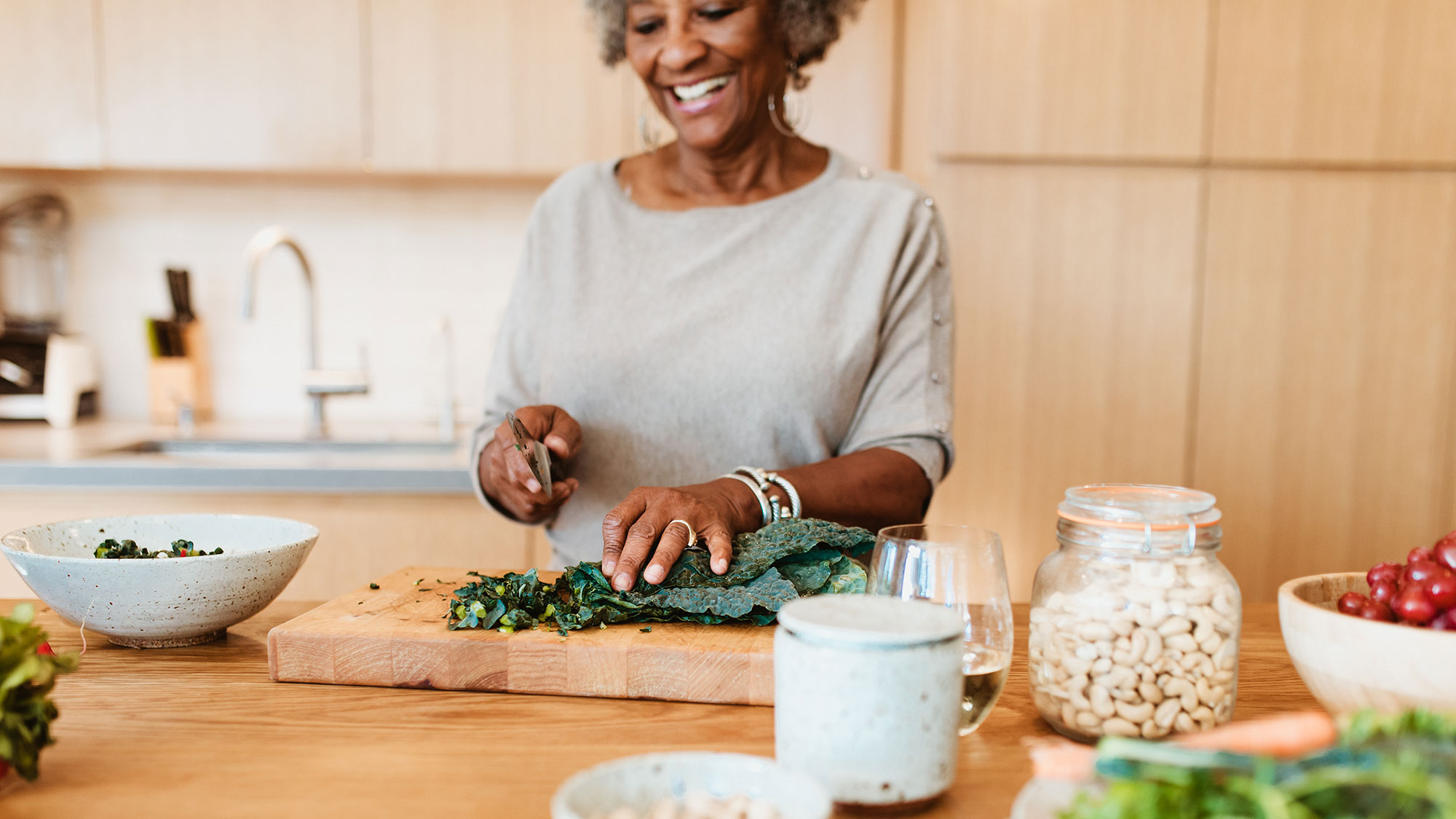
Start your week with achievable workout ideas, health tips and wellbeing advice in your inbox.
You are now subscribed
Your newsletter sign-up was successful
Looking for a complete guide to immunity-boosting foods? We’re here to help you in your mission to stay fit and well this winter with everything you need to know about eating for immunity.
It’s a fact that most of us feel our best once summer is well under way. It’s not always a definable ‘thing’ – but aches and pains seem to subside, stress levels lower, our mood is lifted and the cogs and wheels whirr in easy harmony.
A 2015 study by Cambridge University confirms that this is because our immune systems are stronger - so inflammation is lower - in the summer months. Almost a quarter of our genes are more active at some times of the year than others – and many of these seasonal genes are involved in the immune system and inflammation.
Scientists have known for some time that various diseases (including cardiovascular, autoimmune and psychiatric disorders) display seasonal variation. However, this was the first time researchers have shown the two may be linked.
‘Our immune systems appear to put us at greater risk of disease related to excessive inflammation in colder, darker months,’ says Professor John Todd, director of the JDRF/ Wellcome Trust Diabetes and Inflammation Laboratory.
But if you act now, you don’t have to lose those good feelings as the temperature drops - all it takes is a few simple good lifestyle habits and the right diet choices.
The best immunity-boosting foods
The list of immunity-boosting foods can be split into three key areas - savoury, sweet and snacks - as outlined below. Ensure you eat 10 or more of these a week to give your immune system a fighting chance of beating the bugs and avoiding inflammation this winter.
Start your week with achievable workout ideas, health tips and wellbeing advice in your inbox.
SAVOURY FOODS
- Pulses (beans, peas and lentils, especially black beans)
- Whole grains (wholemeal bread, rye or spelt, oats, brown, red and black rice, brown pasta, oat and rye crackers)
- Tofu
- Whole non-grain carbs (quinoa, wild rice)
- Green veg (broccoli, spinach, kale)
- Orange and red veg (tomatoes, sweet potatoes, red cabbage, pumpkin and squash)
- Good fats (oily fish, olive oil, avocado, nuts and seeds)
- Organic meat, poultry and game
- Fermented foods such as sauerkraut
- Herbs and spices (black pepper, turmeric and ginger)
SWEET FOODS
- Berries (strawberries, raspberries and blueberries)
- Cherries
- Goji berries
- Cranberries
- Organic yogurt
- Pineapple
- Porridge with cinnamon
- Prunes and plums
- Fresh fruit and veg smoothies
- Dark chocolate – but just a couple of squares
SNACKS
- Walnuts and almonds
- Red pepper sticks
- Carrot sticks
- Sunflower seeds
- Celery
- Chia seeds
- Pea and mint pâté
- Aubergine dip
- Houmous
Immunity-boosting foods: top tips
- Get enough omega-3
Make eating enough omega-3 foods a priority.
‘Omega-3 fatty acids are naturally anti-inflammatory and are found in oily fish – eat as much as you like of the smaller ones like anchovies and sardines, which are lower down the food chain and have a lower risk of toxins such as mercury than their larger cousins,’ says Harley Street nutritional therapist Yvonne Bishop-Weston.
Tuck into flax and hemp seeds and oils, chia seeds and walnuts too, which are also naturally rich in omega-3.
If you prefer to take a supplement, check out our pick of the best fish oil supplements. ‘If you have any health conditions or take any medications, please check with your GP before taking any supplements,’ says Yvonne.
- Watch your blood sugar levels
Keeping blood-sugar levels balanced also fights inflammation. ‘Always have breakfast within an hour of waking, eat every four hours if you can and have protein with every meal as it slows the release of carbohydrate sugars into the blood, which stops our blood-sugar levels yo-yoing. When they swing, we overuse insulin, gain body fat and initiate inflammation,’ cautions Yvonne.
Too much insulin also triggers an inflammatory response that depletes the immune system and makes us more susceptible to winter illness. Discover more on how to lower blood sugar in our handy guide.
- Eat your five-a-day - and then some
Yvonne says we’d do better to eat eight or nine portions of fruit and veg a day than five. ‘Aim for a daily rainbow of colours, as the different hues bring different nutrients – and go for more veg than fruit to avoid a high sugar intake.
‘Include purple veg for powerful antioxidants and green leafy veg for the relaxing mineral magnesium, which also helps the body absorb calcium and strengthens bones. Make simple switches, like using red cabbage for coleslaw and red onions when cooking.
READ: Easy ways to eat your five a day
- Get the right vitamins
We need whole grains, beans and pulses for inflammation-reducing B vitamins, antioxidants and minerals such as magnesium (good for the nervous, muscular and cardiovascular systems), potassium (essential for the heart, kidneys, muscles, nerves, and digestive system to operate normally, and for regulating fluid balance and blood pressure), and B vitamins.
‘Antioxidants are lost from white refined products,’ says Yvonne. ‘Stick to wholemeal bread, brown rice and wholewheat pasta, and try other carbohydrate choices, such as quinoa, spelt and rye.’
- Know which foods to avoid
Saturated fat is thought to contribute to inflammation. ‘Avoid, or eat only minimally, high-fat cheese and intensively reared meat. Free-range and organic meat, which has had room to roam and eaten a natural plant-based diet, has a healthier fatty acid composition,’ says Yvonne.
Meanwhile, refined sugar – as used in sweets and cakes, colas and processed food – can spike blood-sugar levels and trigger the release of insulin, a hormone that may trigger inflammation. Try using a sugar substitute where you can instead.
Eating for immunity at every age
- Thirties
Your immune system is strong and inflammation should be at a minimum. However, you could try taking an age- and gender-appropriate multi-vitamin.
- Forties
You may be entering the perimenopause, which could increase inflammation. Keep blood-sugar levels balanced and top-up nutrients. Fish oils are helpful.
- Fifties
As well as affecting mood and sleep, the menopause can hinder bone health. Top up on whole grains, beans, pulses, oily fish and magnesium-rich green leafy veg as part of your menopause diet.
- Sixties and beyond
A reduction in your digestive enzymes may slow down the release of nutrients and lead to bloating. Support digestion by chewing well and discuss taking a plant-based digestive enzyme with a registered nutritional therapist. Protect against degenerative conditions with a mineral supplement containing calcium, magnesium, vitamins K and D, plus an algae or fish oil.
Launched in 2020, Fit&Well.com is all about helping you meet your health and fitness goals in ways that are fun and achievable. With news and features on fitness, weight loss, running, nutrition, yoga, wellness and more, we're committed to helping you wherever you are on your fitness journey. We break down the best fitness tech, with reviews, buying guides and the latest deals on fitness and wellness kit, from dumbbells to diffusers.
We cater for all difficulty levels here. It doesn't matter if you're a beginner in the world of fitness or you're gearing up for your tenth marathon: we're all moving towards the same goal – creating a healthier, happier you. From guides on getting started doing walks around the block, to creating the perfect work-from-home space, to eating to fuel your first triathlon. It's all here.

